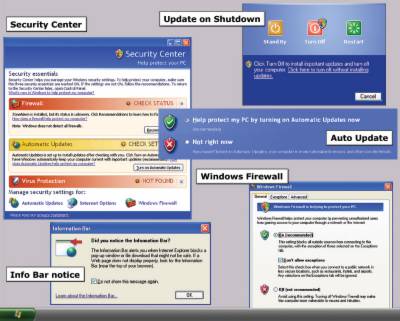http://www.pcmag.com/article2/0,1759,1632981,00.asp
Operating systems just ain't what they used to be. For a while, Microsoft released a new version of Windows every two or three years—each creating a ripple effect on how we all used and thought about technology. But now, there's a long wait on. It looks like we won't see even a widespread preview of the next major version of Windows, code-named Longhorn, until the first half of next year; and we'll be waiting for a shipping version until at least 2006 or 2007. That's more than five years after Windows XP shipped in October 2001. Meanwhile, questions are swirling about what will be in Longhorn, and even about whether any new version of Windows can really change the way we use computers.
The very success of Windows—it's now on over 90 percent of desktop PCs—has created a technology monoculture that is both resistant to change and a target for malicious hackers. One reason for Longhorn's delay is that all of the recent threats against Windows made Microsoft realize that customers needed more immediate help. As a result, Microsoft focused more on adding new security features to Windows XP Service Pack 2 and getting it out the door (which should happen very shortly). "We actually had to reallocate resources and programmers who were on the Longhorn team to work on SP2," says Greg Sullivan, a lead Windows product manager. Microsoft was making these moves at the same time criticism was raining down on it for the role Windows has played in permitting the propagation of viruses and other computing threats. (For more on this subject, see "Is Microsoft to Blame?" in our August 3 issue.)
In addition to improving security in the underlying Windows code, SP2 will include several enhancements that make it easier for users to configure their systems to be safe—and stay safe. SP2 will automate the installation of critical security patches and turn on an improved firewall by default, and it will include a new security center to monitor the status of OS updates as well as your antivirus and firewall. It also has features that IT managers can use to customize security in enterprises and small businesses.
Because SP2 is the most significant update to Windows that Microsoft plans to release before Longhorn arrives, beta testers are scrutinizing it closely. Some have reported potential compatibility and support problems stemming from the new firewall and automated updates. "Many people are worried about it," says Tom Stachowiak, one of the beta testers, "but it works pretty well. I've run into only one minor compatibility problem. While this may not stop all our security woes, it's a big step forward. My system also runs a lot faster."
The very success of Windows—it's now on over 90 percent of desktop PCs—has created a technology monoculture that is both resistant to change and a target for malicious hackers. One reason for Longhorn's delay is that all of the recent threats against Windows made Microsoft realize that customers needed more immediate help. As a result, Microsoft focused more on adding new security features to Windows XP Service Pack 2 and getting it out the door (which should happen very shortly). "We actually had to reallocate resources and programmers who were on the Longhorn team to work on SP2," says Greg Sullivan, a lead Windows product manager. Microsoft was making these moves at the same time criticism was raining down on it for the role Windows has played in permitting the propagation of viruses and other computing threats. (For more on this subject, see "Is Microsoft to Blame?" in our August 3 issue.)
In addition to improving security in the underlying Windows code, SP2 will include several enhancements that make it easier for users to configure their systems to be safe—and stay safe. SP2 will automate the installation of critical security patches and turn on an improved firewall by default, and it will include a new security center to monitor the status of OS updates as well as your antivirus and firewall. It also has features that IT managers can use to customize security in enterprises and small businesses.
Because SP2 is the most significant update to Windows that Microsoft plans to release before Longhorn arrives, beta testers are scrutinizing it closely. Some have reported potential compatibility and support problems stemming from the new firewall and automated updates. "Many people are worried about it," says Tom Stachowiak, one of the beta testers, "but it works pretty well. I've run into only one minor compatibility problem. While this may not stop all our security woes, it's a big step forward. My system also runs a lot faster."
posted by _[ n S r ]_ at 12:24 PM
